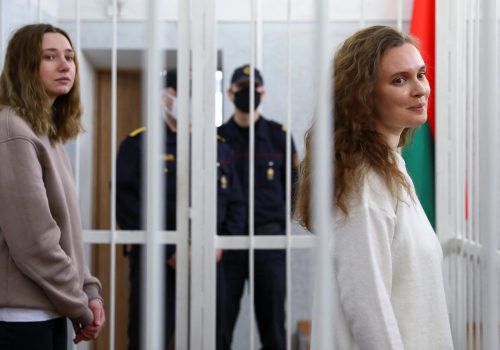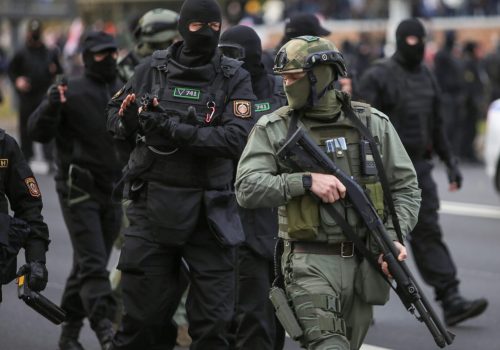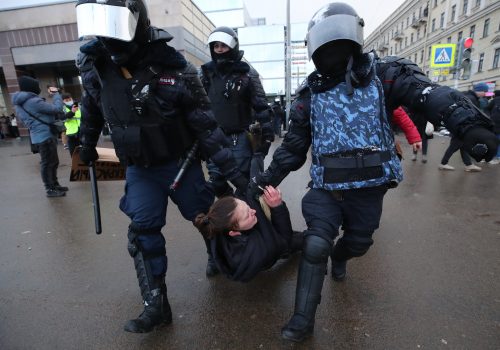[Editorial note: since the publication of this article, Ihar Losik has reportedly ended his hunger strike.]
On March 11, jailed Belarusian blogger Ihar Losik was presented with additional criminal charges. In protest, he attempted to slit his wrists in front of an investigator and a lawyer. When prevented from doing so, Losik announced that he was restarting his hunger strike. This time, he said, he would refuse all liquids as well as food. Already weakened by a previous hunger strike and an extended period in prison, fears are now mounting that Losik may not survive much longer.
Losik launched his initial hunger strike on December 15 in response to the charges filed against him for “plotting riots” in connection with the protest movement that has swept Belarus since the country’s deeply flawed August 2020 presidential election. It is not clear how Losik could have participated in the plotting of riots, however, as he has been detained since June 2020. He faces the prospect of an eight-year prison term if convicted. The charges against him have been widely condemned as politically motivated.
Between December and January, the jailed blogger refused all food for 42 days. He only called off his hunger strike due to what he described as “an unbelievable wave of solidarity,” and the fact that two students and an Orthodox priest also began hunger strikes in support of his cause. “I know that many also went on hunger strikes. I cannot take on such a great burden of responsibility, I do not want others to suffer due to my conscious choice,” Losik said in a statement via his lawyer on January 25 when announcing an end to his initial hunger strike.
During his term in prison, Losik has been repeatedly transferred from one cell to another while also being deprived of the right to receive letters and other information. His wife Daria accuses the Belarusian authorities of creating “torture chamber” conditions. She says Losik is being held in a cold cell with no sunlight or fresh air and rudimentary toilet facilities.
Supporters claim the case against Losik is full of lies and examples of misconduct. When members of the Belarusian security service first rang the doorbell of his apartment on June 25, 2020, they allegedly threatened to blow the door open if Losik did not allow them in. The officers then ordered Losik, who also works as a consultant for RFE/RL on new media technologies, to accompany them to the police department. They needed him to “sign a paper,” they explained. After that, “he would be released,” they allegedly promised. “Take some cash to buy a bus ticket to get home. You will be back soon,” they added.
Losik never came home. He has been in custody ever since. The 28-year-old husband and father of a two-year-old daughter has been held in pre-trial detention in Zhodzina for more than 260 days. He was initially charged with “preparing to disrupt public order.” Further charges continue to be added.
The mounting charges against Losik reflect the Lukashenka regime’s hardline approach to anti-government protests. On the same day the blogger was taken into custody, then-Belarusian Interior Minister Yuri Karaev claimed in an address to the Belarusian Parliament’s lower chamber that recent protests were organized and coordinated through YouTube livestreams and Telegram channels. He also mentioned RFE/RL’s coverage of a June 18 demonstration in Minsk as an example. Over the next 24 hours, three popular Belarusian YouTubers (Uladzimir Niaronski, Uladzimir Tsyhanovich, and Siarhei Piatrukhin), all faced the same charges as Losik. A fully-fledged witch hunt against independent Belarusian bloggers had begun.
Losik had been on the radar of Belarusian law enforcement since at least 2011, when the so-called “Revolution Through Social Networks” took place in Minsk and other regional cities across Belarus. This was essentially a series of peaceful flash mobs that saw people meet at the same time and place each week to clap. Their relatively innocuous form of protest continued throughout June and July 2011, and made dictator Alyaksandr Lukashenka angry enough to issue a decree banning hand-clapping in public. Meanwhile, Lukashenka’s security forces cracked down on the protests. Participants were beaten, dispersed, or arrested.
The protesters, mostly in their 20s, communicated through internet platform Vkontakte, the Russian-language answer to Facebook. Losik was one of the administrators of the online community behind the 2011 protests. The Belarusian KGB identified him as a leading figure in the protest movement and forced Losik to stop promoting the clapping campaign.
Despite this setback, Losik remained active online. In subsequent years, his Twitter account and Telegram channel became among the most popular in Belarus. He wrote about Belarusian politics along with events in Russia and Ukraine, focusing on protest movements and propaganda. Losik never courted publicity or popularity. Instead, having completed a fellowship at RFE/RL in Prague and Washington DC, he returned to the provincial Belarusian town of Baranavichy, where he lived with his wife and newborn child until he was arrested.
Despite Losik’s unremarkable surroundings, his online activities made him an obvious target for the authorities. During the first wave of the coronavirus pandemic in Belarus, Losik undermined official denials by reporting details of the dire situation in many hospitals. Medical workers anonymously told him that there was no protective equipment and leaked information that the death rate was higher than the official statistics. Beginning in May 2020, he closely followed mounting anti-regime protests on his popular Telegram channel.
Eurasia Center events

Given his relatively high profile and record of online activism, Losik’s arrest was not entirely surprising. At first, the tone of his letters from prison was optimistic and hopeful. However, the blogger’s state of mind began to deteriorate after the controversial August 9 Belarusian presidential election. His wife explains that he had no prior experience of prison conditions or being kept in isolation from his family.
In February 2021, when a Belarusian court handed a two-year jail sentence to Belsat journalists Katsiaryna Andreeva and Daria Chultsova, Losik’s mood worsened. “I have no illusions. I think it will be about five more years, and by that time I will have died. I no longer have any desire to do anything,” he wrote in a handwritten letter published online. “So much has already been done, and all for naught. Nothing influences anybody. I’ll say it honestly: I doubt anything will change.”
The Belarusian authorities continue to extend Losik’s pretrial detention. His case appears to be frozen. The extension of custody time limits is a common tactic used by the Lukashenka regime. It allows the authorities to keep a detainee in jail for as long as required without sending their case to court.
The jailed blogger, who desperately wants to see his wife and daughter, ended his last letter with these words: “It would have been better to just shoot me quickly so I didn’t have to see it all.”
The Co-chairs of the Human Rights Commission of the US House of Representatives have urged the government of Belarus to immediately release Losik, as has RFE/RL President Jamie Fly.
More needs to be done urgently in order to avert tragedy. Losik’s recent vow to escalate his hunger strike places his life in direct danger. There may not be much time left to secure justice for this talented young blogger and political prisoner before it is too late.
Hanna Liubakova is a journalist from Belarus and nonresident fellow at the Atlantic Council. She tweets @HannaLiubakova.
Further reading
The views expressed in UkraineAlert are solely those of the authors and do not necessarily reflect the views of the Atlantic Council, its staff, or its supporters.

The Eurasia Center’s mission is to enhance transatlantic cooperation in promoting stability, democratic values and prosperity in Eurasia, from Eastern Europe and Turkey in the West to the Caucasus, Russia and Central Asia in the East.
Follow us on social media
and support our work
Image: Jailed Belarusian blogger Ihar Losik, seen here in an archive photo from 2016, is currently on hunger strike in protest at his ongoing detention.




